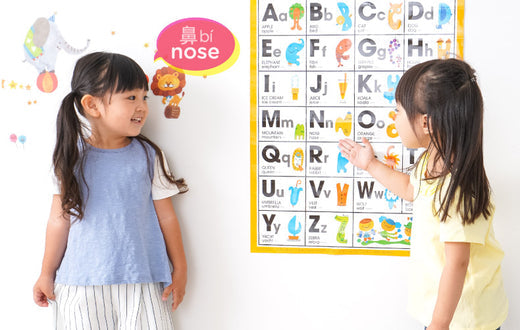

What are the benefits of raising bilingual children in Singapore?
Living in Singapore exposes one to at least four different languages - Malay, Tamil, Mandarin, and English with all its varied dialects. Learning more than one language is useful and occasionally even required in today's globalised and multicultural world. Children are extremely perceptive to the various speech patterns that people use. They pick up on distinctions in speaking styles between men and women and between polite and unpleasant ways of tonality, very rapidly, even when they only hear one language. For children, bilingualism is just another instance of human diversity! At a very young age, children tend to get hold of multiple languages. But why is being bilingual so important? According to research, youngsters who are exposed to multiple languages are more likely to have stronger language abilities. For instance, processing and manipulating speech sounds as well as acquiring new language helps build the propensity for flexible thinking, superior problem-solving ability, and the potential to use information in novel ways.³² So how does one go about raising bilingual children and what are the benefits of doing so?
Children pick up languages easily in their early years; in fact, the Singapore Government is looking to strengthen bilingual education in pre-schools to seize this window of opportunity.6 In his speech at the 2017 National Day Rally, Prime Minister Lee Hsien Loong said, "In the first six years, children learn and develop rapidly. Their brains are like sponges, quickly absorbing what they see, hear, and feel," further adding that “we need to catch that moment of development and introduce language, art, music and make a fervent attempt at raising bilingual children in Singapore.”
Did you know that children brought up in bilingual homes have been found to show better learning and memory skills? In fact, children who have strong linguistic intelligence when they are young can become better learners in their school years and beyond.¹ Cognitive skills in children are strengthened by bilingualism as they frequently exhibit greater creativity and adaptability. They are more receptive and find it easier to concentrate on several things at once. Children who speak two languages typically perform better academically. They frequently work more effectively as well.
If you want to raise your children to be bilingual, research shows that play and social interaction are great ways for them to learn. It is never too late to start learning a second language; however, the earlier you can start, the better.
In the first five years of life, a child's brain develops at an incredibly high rate of 90%!² This means there is never a better moment to begin learning a second language, and doing so as a youngster can have positive social and developmental effects.³ In truth, language development and the building blocks for a lifetime of learning begin long before your children set foot in a classroom.⁴
How to identify the three stages of progressive learning in raising bilingual children²⁹:
Three stages can be identified when the progressive learning process a child goes through to become bilingual is examined:
- The child has a single vocabulary that contains words from both languages;
- The child distinguishes between two lexicons but uses the same grammatical rules in both languages;
- The child has two linguistic codes that are distinct in lexicon and syntax but each language is only associated with the person who speaks that language.
A child can only be considered really bilingual once they are beyond this stage, when there is less of a tendency to group people according to their primary language. The child in effect is now learning two languages at the same time.
As a valued Enfamama A+ club member, you will receive one free lesson as well as 10% off your first LingoAce programme purchase! Sign up here to Enfamama A+ Club and receive a redeemable e-voucher. The LingoAce Chinese Learning Plan makes learning simple. LingoAce was built from the ground up to deliver the most seamless online learning experience. Learning is always efficient and intuitive with LingoAce.
How does nutrition play a role in raising bilingual children?
Both nutrition and parental stimulation are vital in these early stages. According to Dr Wendy Liew, a Paediatrician with a special interest in Paediatric Neurology, parents play an important role in nurturing their child's dual language growth, and a proper balance of nutrients in this period is critical for brain development5 Together, they can play a crucial role in supporting and raising bilingual children on their linguistic journey.

“While every child is born with the ability to mimic sounds of any language, by the time they reach the age of 10 months, the range of sounds they hear around them begins to narrow,” says Dr Liew. “Children who start learning a second language before the age of six or seven years are able to speak the new language fluently, as compared to children who are only exposed to a second language after the age of seven.” she adds. Learning a second language can also help us maintain cognitive health in our later years, according to research.
Why raise a bilingual child in Singapore?

According to Dr Liew, “children who speak more than one language fluently have been shown to have better and long term mental benefits and the development of reasoning and thinking skills. The largest effects are evident in cognitive flexibility such as language, memory⁸, attention⁹, and general intellect.⁷ Research has found that learning a language can even change the structure of a child’s brain, resulting in better integrated brain networks, which in turn allows children to learn more efficiently. Learning a second language can be thought of as ‘brain exercise’, with areas associated with muscle control and sensory perception appearing to be strengthened”
Your family's lifestyle and the languages spoken at home will influence your choices on raising bilingual children. Studying a second language also helps to improve your child’s understanding of their first language.¹⁰ Children seem to have an easier time picking up foreign languages. They can understand the underlying patterns without understanding the rules, unlike us adults who are naturally conscientious of semantic rules.¹¹ Children who speak various languages are more likely to be better at planning, prioritising, and making decisions¹² than children who only speak one language. They are also more likely to perform well in arithmetic, reading, and vocabulary examinations¹³ as well as have an improved ability to pay attention¹⁴, concentrate, and be creative¹⁵, to mention a few!
Nutrition Tip!
Good nutrition has beneficial effects on learning and concentration. This In turn might affect early language development. Wholesome nutrition is crucial for brain growth and lays the groundwork for the development of cognitive and linguistic abilities especially when raising bilingual children. Why is a healthy diet so crucial to language development? Learning and focus are benefited by a good diet. Early language development may be affected by nutritious foods that work as brain boosters, enhancing cognition, vigilance, focus, and memory. A child's mood, attentiveness, and ability to make decisions are all better when they eat well and exercise regularly (60 minutes per day is recommended for school-age children and adolescents). They also have more restful sleep at night. New neural networks develop in the child's brain as neurons are fired. The youngster is alert and has a better span of attention. Improved linguistic and cognitive development in children is also directly linked to an overall healthy diet, which benefits cognitive development in multiple ways.³⁰
Children should be eating a wide range of foods to ensure they get all the calories, protein, vitamins and minerals needed for growth and early brain development. Whole grains, green vegetables, and legumes are healthy foods that can work as brain boosters, enhancing cognition, vigilance, focus, and memory. It is advisable to use ingredients from all four of these major food groups while cooking¹⁶:
- Fruit and vegetables
- Bread, rice, potatoes, pasta and other starchy foods
- Meat, fish, eggs, beans and other non-dairy sources of protein
- Milk, dairy foods
Try to include as many colours of the rainbow in your diets as possible. The colours on your plate can provide a wide variety of vitamins, minerals and antioxidants!17
What challenges or common misconceptions might I encounter along the way?

According to Dr Liew, “in the past it was believed that if children were exposed to more than one language, it could confuse them and lead to speech delays.¹⁸ However, research has shown that there are many cognitive benefits for young children who are exposed to more than one language simultaneously.”
In fact, bilingual children display social empathy and communicate better with their peers than those who grow up speaking only one language.¹⁹ The most common problem a child learning two languages faces is the confusion between which languages to choose from when speaking. It’s important to remember that this is completely normal and may carry on later in life as well. But, when one is older, speaking two languages at once can be seen as a stroke of genius!²⁰
Nutrition Tip!
The most important meal of the day for a child is breakfast!²¹ And raising bilingual children requires wholesome, nourishing foods right from the start of the day. Did you know that children who eat breakfast before school are twice as likely to perform well on tests?²² A nutritious and well-balanced meal that incorporates all of the food groups, including milk, will help start the day off right. You can supplement your child’s diet with milk formula containing important nutrients like DHA, vitamins, minerals, and prebiotics. Starting the day with a nutritious, well-balanced meal helps your child concentrate y and learn to their full potential.22 This is especially important at the start of their linguistic journey.
What practical tips and tricks can I use to help raise my bilingual child’s confidence?
There are so many fun ways you can set your child on the right path to bilingualism. Why not introduce them to foreign language books, nursery rhymes, CDs, and TV shows aimed at young children as a starting point. If you are a bilingual family, ensure one parent speaks the second language as much as possible to the child so they become fully “immersed” in it. How about labelling all your household objects in the foreign language and practising identifying them together? If your child doesn’t have the chance to learn a second language at home, think about enrolling them in a language class for children.
Looking for minimum stress and maximum fun when it comes to learning languages? We all know that nutrition is essential throughout the first few years of your child’s life,²³ so why not use food to pique your child’s interest while ensuring they receive the right nourishment? No matter how old your child is, they can have fun learning new words while playing with simple food.
Here are some simple, fun activities you can try at home using different languages:
Using your fruit bowl: Can your child name the fruits in the bowl? What colour are they? How many are there? What do they smell like? What do they feel like?²⁴
Take advantage of everyday activities.While putting together your weekly shopping list, discuss with your child what you plan to buy from the shops, how many of them you may need and what you will make with the purchases. Don’t forget to talk about the size (small? large?), shape (long? round? square?) and weight (light? heavy?) of the packages and produce.²⁵
Introducing cooking at an early age is a great way for language development as it has its own special vocabulary.Matching pictures to words and starting to ask questions inspired by their new culinary experiences, are a few ways to get your child to engage with you in the new language.²⁶
Nutrition Tip!
The early years of your child’s life are a period of speedy growth. During this time, it is important that they get all the nutrients that are crucial for good growth and development. Nutrients like DHA, an essential fatty acid,²⁷ are important for brain and eye development. Help ensure they’re getting enough of the good stuff by serving up DHA-rich foods such as salmon, eggs, yogurt, peanut butter, and formula.²⁸

Fuelling Their Bilingualism
Learning a new language is no easy feat. And raising bilingual children may seem like an even bigger challenge. Being bilingual has several advantages, from fostering cultural relationships to expanding one's educational options. Additionally, studies demonstrate that it strengthens the brain by increasing the volume of grey matter and the integrity of white matter in regions that are important for executive function, or the capacity of individuals to control their behaviour.³¹ Hence, the more effort your child puts in, the more energy they need to support their progress. It is crucial that you choose a diet that provides a balance of vitamins and nutrients to support their linguistic journey ahead.
References:
- https://www.psychologytoday.com/blog/radical-teaching/201211/bilingual-…
- http://toosmall.org/news/commentaries/childs-first-5-years-hold-key-to-…
- http://www.child-encyclopedia.com/second-language/according-experts/sec…
- http://toosmall.org/news/commentaries/childs-first-5-years-hold-key-to-…
- DeLong RG. Effects of nutrition on brain development in humans. American Journal of Clinical Nutrition. 1993; 57: 286S-290S.
- http://www.straitstimes.com/singapore/national-day-rally-a-boost-in-bil…
- http://www.bbc.com/news/health-27634990
- http://www.sciencedirect.com/science/article/pii/S002209651200166X?via%…
- http://brainblogger.com/2013/03/29/bilingualism-may-be-neuroprotective/
- http://www.mastersintesol.net/resources/second-language-learning-benefi…
- http://www.telegraph.co.uk/education/educationopinion/10315238/Are-chil…
- http://www.sciencedirect.com/science/article/pii/S001002771300228X
- https://www.theatlantic.com/health/archive/2014/10/more-languages-bette…
- http://www.pnas.org/content/109/20/7877
- https://www.psychologytoday.com/blog/attention-training/201405/being-bi…
- http://www.enjoyhealthyeating.info/nutrition/children-aged-1-5-years/he…
- http://www.drshawnteyates.com/color-your-plate/
- http://www.child-encyclopedia.com/second-language/synthesis
- http://healthland.time.com/2013/04/23/bilingualism/
- https://www.linguisticsociety.org/resource/faq-raising-bilingual-childr…
- http://www.independent.co.uk/news/education/education-news/children-who…
- http://www.broward.org/Parks/Extension/Nutrition/Pages/WhyGoodNutrition…
- http://healthyeating.sfgate.com/importance-good-nutrition-kids-6236.html
- https://bilingualkidspot.com/2017/01/23/cooking-with-languages-kids-lea…
- http://www.hanen.org/Helpful-Info/Articles/-A--is-for-Apple--What-Kids-…
- http://growing-minds.org/documents/cooking-with-children-in-licensed-ch…
- Rosales FJ, Reznick JS, Zeisel SH. Understanding the role of nutrition in the brain and behavioral development of toddlers and preschool children: identifying and addressing methodological barriers. Nutritional Neuroscience. 2009; 12(5): 190–202.
- https://sg.theasianparent.com/8-best-dha-foods-for-kids/
- https://www.cambridge.org/core/journals/journal-of-child-language/artic… The acquisition and development of language by bilingual children* Published online by Cambridge University Press: 26 September 2008 Virginia Volterra and Traute Taeschner, Institute of Psychology, C.N.R., Rome, and University of Rome
- https://connectedspeechpathology.com/blog/jump-start-language-developme… Speech connected pathology 2022. Jump Start Language Development with Good Nutrition For Children. Allison Geller.
- https://inside.isb.ac.th/nativelanguage/2018/12/10/bilingualism-boost-b… How Bilingualism Can Boost the Brain December 10, 2018 by ISB Native Language Programs
- https://www.washington.edu/news/2017/07/17/bilingual-babies-study-shows… July 17, 2017 Bilingual babies: Study shows how exposure to a foreign language ignites infants’ learning Deborah Bach





